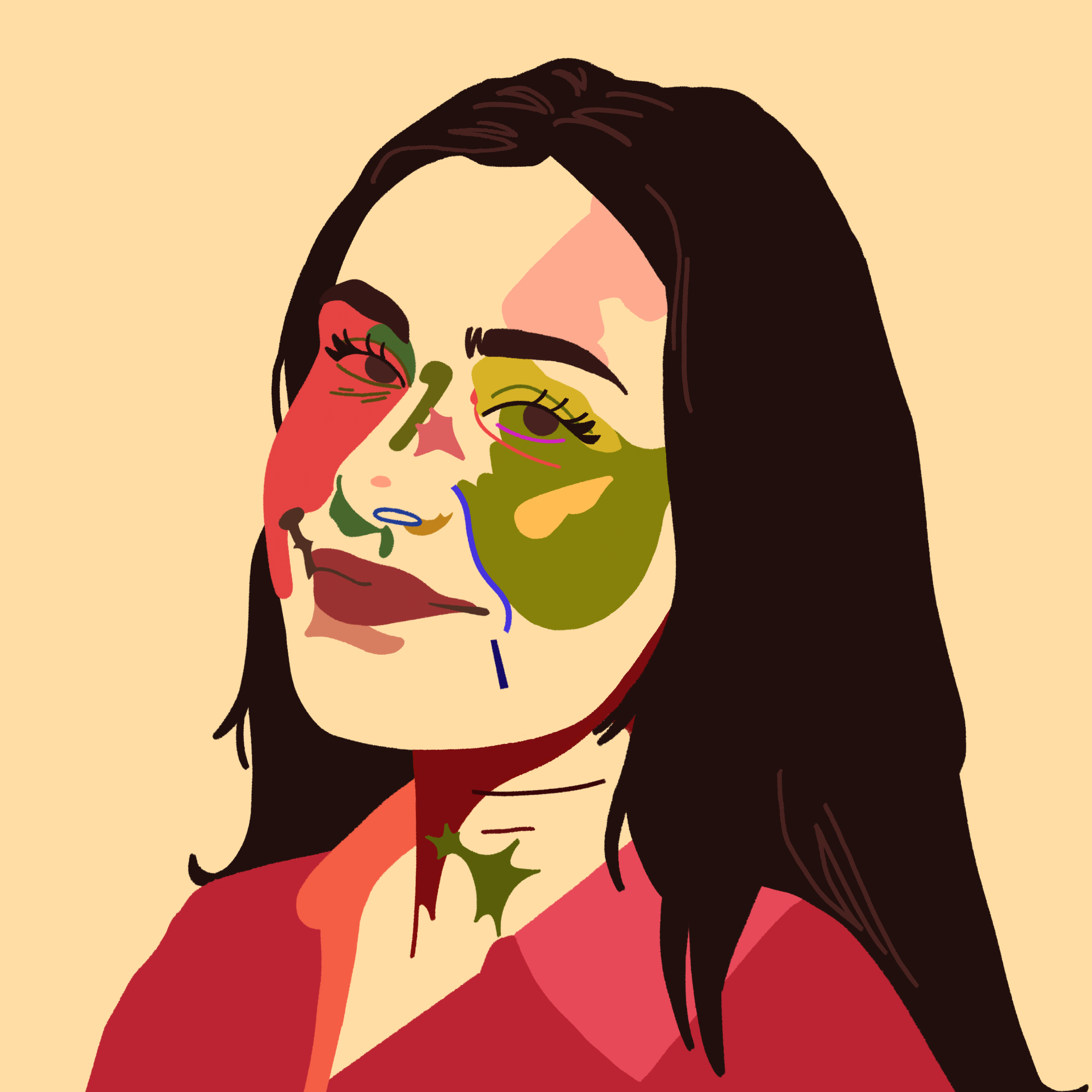
Reviving roots: How an Indigenous professor finds her home
Listen to the Story
Click here for audio transcript
Dawna Riding In Hare: Well my heart’s always been here in Pawnee, no matter where I’ve lived, and even though I didn’t grow up here, um the love that my father had for you know, Pawnee and his tribe, always resonated with me, and like so many Pawnees that grow up away.
I am Dawna Riding in Hare. I serve on the Pawnee Business Council. I teach at Oklahoma State. And I have three children and seven grandchildren..
My primary goal was to come and raise my children in Pawnee because I wanted to grow up with the Pawnees, and I did not.
I was born when my dad was an educator on the Northern Cheyenne reservation in Montana. And then we lived in Durant for five years and then we went out to the Navajo reservation where my parents were educators. And so I always wanted to live with my own tribe, and I always wanted to be around my own people.
And there was one time my grandmother was talking to her friend. And she said, they were talking about me, and I was about 13 years old at the time, and they said, my, this one, you know, sure wants to be Pawnee. And I thought, What are they talking about? I am Pawnee.
I grew up hearing a lot of stories about my dad who went to this boarding school, he came here when he was seven years old, he did not speak English.
We’re talking about this school. And we’re talking about this building. And I talked about working in this building for 24 years. My dad’s sister died upstairs when she was 10 years old, of spinal meningitis. Her younger sister, who was eight years old, sat on those stairs right out there and cried when she found out. You know I worked in the building with their memories.
I guess home is, this is kinda corny, where your heart is. But there’s another. We have a preacher here in Pawnee. And one time he said home is where you bury your people, and it’s true, because there’s so many Pawnees who live away, who come back home for burial. Who their families bring them back for burial. So it’s, you know, where you live and where you, you know, bury those that have, you know, gone on before you.
This, you know, is our second homeland and we lost our first homeland and, and um many still have very fond feelings about it, even though they did not grow up there. There’s always those who go back and we have a lot of people who go back up to Nebraska, they just get such a feeling of belonging there, like home.
My great-great-grandmother, her name was Lottice Walking Bear Fancy Eagle. And she walked down from Nebraska. And so they call a lot of those people during that era the old ones.
When I think of our Nebraska home, I think of the rivers. I see the rivers and they don’t cut through, they don’t look violent, they’re just in the um grass, you know, they’re just right along with the grass line. And it is so beautiful. A lot of people,– I felt this way – it was very spiritual going up there.
I really feel at home during our tribal veterans homecoming because for the first time, we’ve held it out here on our tribal lands in Pawnee with the Pawnee because this is our land we’re dancing on and it really I think that really added to home. People were saying that when we were out there dancing this year. And I’d really encourage you know, any of the young, you know, Pawnees that can go up there, you know, to go. Anybody that’s really wanting to connect with their tribe. Don’t give up. Even if you don’t feel wanted at times. You are. And there’s people that do want you, um, so don’t give up. [She laughs softly]
What is the meaning of
home?
Tylie Griffith Bookout speaks with Dawna Riding in Hare on the former campus of the Pawnee Indian Boarding School. The purpose of this building and others here is to now serve the Pawnee people by housing their administration offices, educational establishments, and stand as a mark of history. Riding In Hare is one of these Pawnee citizens, and she shares what home means to her.
“My dad’s sister died upstairs, when she was 10 years old, of spinal meningitis.”
Built with old, tan stone and rectangular windows with splintering, white wooden trim, the Pawnee Tribal Administration building has extensive history. A long walkway sits in front, a wide and welcoming entrance to all. Dawna Riding In Hare worked there for over two decades.
“Her younger sister, who was 8 years old, sat on the stairs right out there,” she said, pointing, “and cried when she found out. And so I worked in the building with their memories.”
Riding In Hare sat at the head of a wooden table in a small conference room, the afternoon light spilling warmly through faded white curtains. Sixty-five years ago, this had been the girls dormitory for the Pawnee Indian Boarding School — the very same boarding school her father and two aunts attended.
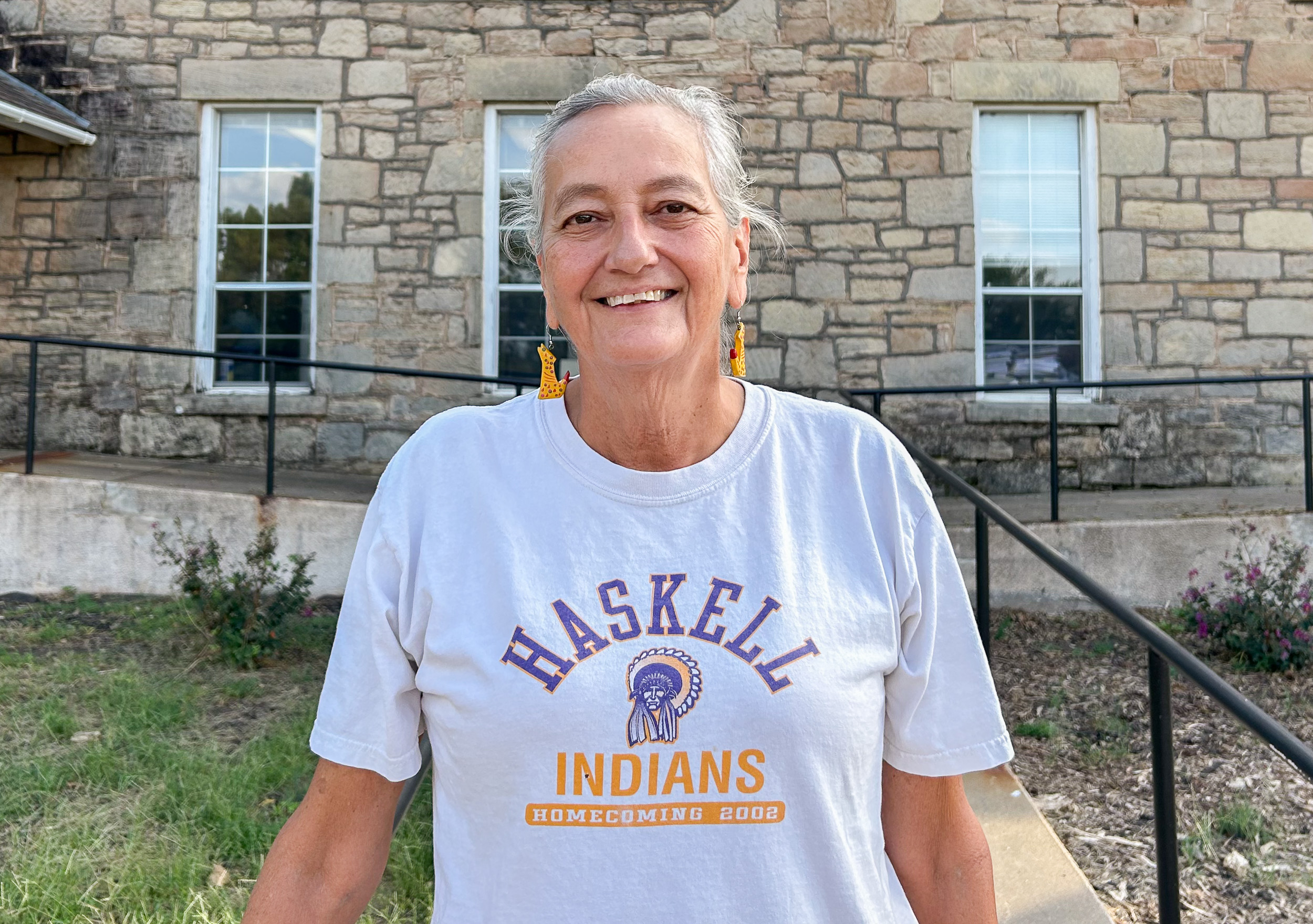
Riding in Hare stands in front of the Pawnee Indian School’s girls dormitory, Monday, Oct. 5, 2023, now converted to the Pawnee Tribal Administration Office where she worked for 24 years. “I was able to serve my tribe and be part of its growth and development. And that’s been exciting and rewarding,” said Riding in Hare.
TYLIE GRIFFITH BOOKOUT / NEXTGENRADIO
Riding In Hare, a professor of Native American studies, believes it is vital to keep alive the stories of those who came before her. That includes stories about her father’s experiences as a teacher. Old vanilla papers were splayed out on the desk in front of her.

ARD SU / NEXTGENRADIO
“I have some letters from 1968, which I found in my dad’s stuff,” she said. “I think the writing assignment was, ‘What is a good teacher?’ I looked at these dates, and my dad had just transferred from this school. … Those are just letters, and the ones that really stuck out to me [were] the ones where they kept talking about how he explained things to them.”
Like her parents, Riding In Hare is an educator. A professor at Oklahoma State University in Stillwater, Oklahoma, she teaches Intro to American Indian Studies, lecturing on American Indian history, culture, societal issues and important topics pertaining to Native American people. She also teaches American Indian Sovereignty, a course on tribal sovereignty, law, culture and politics.
Whether on the OSU campus or in Pawnee, Oklahoma, she can hardly step into an environment without someone rushing to talk to her. When she walks into the Pawnee Tribal Administration Building, all the workers call her name to say hello. Her tall frame, long silver hair, colorful dangling earrings and warm smile are easily recognizable.
I’ve lived a lot of places. But I’ve never felt the contentment that I have living here. And it’s kind of like a magnet, you know, and it draws people back.
Her parents were educators of Indigenous youth, so Riding In Hare grew up on the Navajo reservation, the Cheyenne reservation in Montana, and in Durant, Oklahoma, but not with her own people — the Pawnee tribe.
But Riding In Hare had close ties to her family. When her mother died, her aunt — the one who cried on the steps — stepped in to help raise her. She noted that in the Pawnee language, the word aritat means both mother and aunt, signifying the importance of aunts. Her uncle also cared for her when her father died, and now she wants to show others this same kind of love.
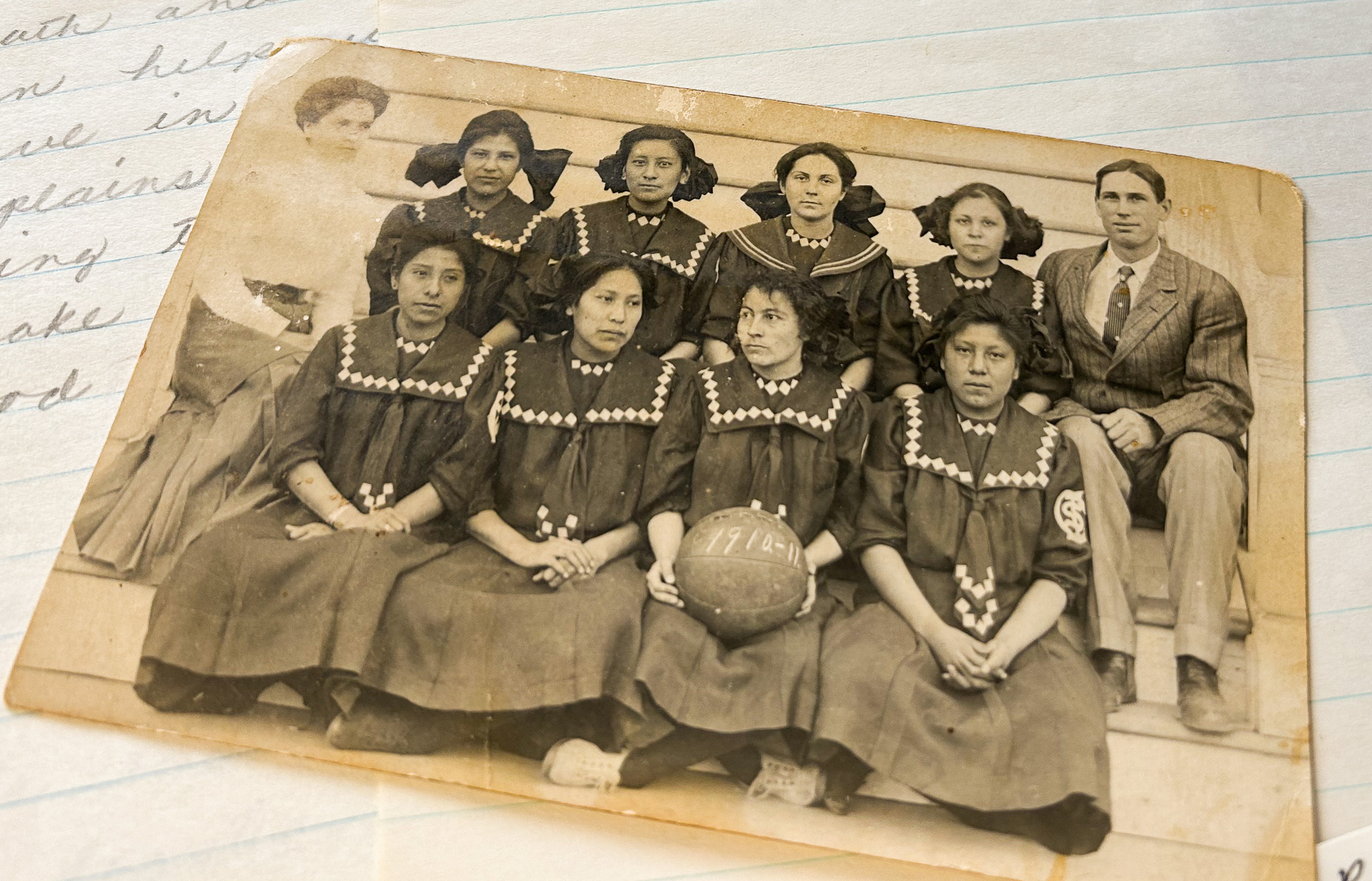
Riding in Hare’s grandma poses with the girls’ basketball team at Chilocco Indian School in Kay County, Oklahoma. “My grandmother was a real small, little lady, but I always felt so safe with her,” she said. “I always felt that, because of the respect that people had for her, that I was always safe, right by her side, even during political times when there was a lot of conflict.”
TYLIE GRIFFITH BOOKOUT / NEXTGENRADIO
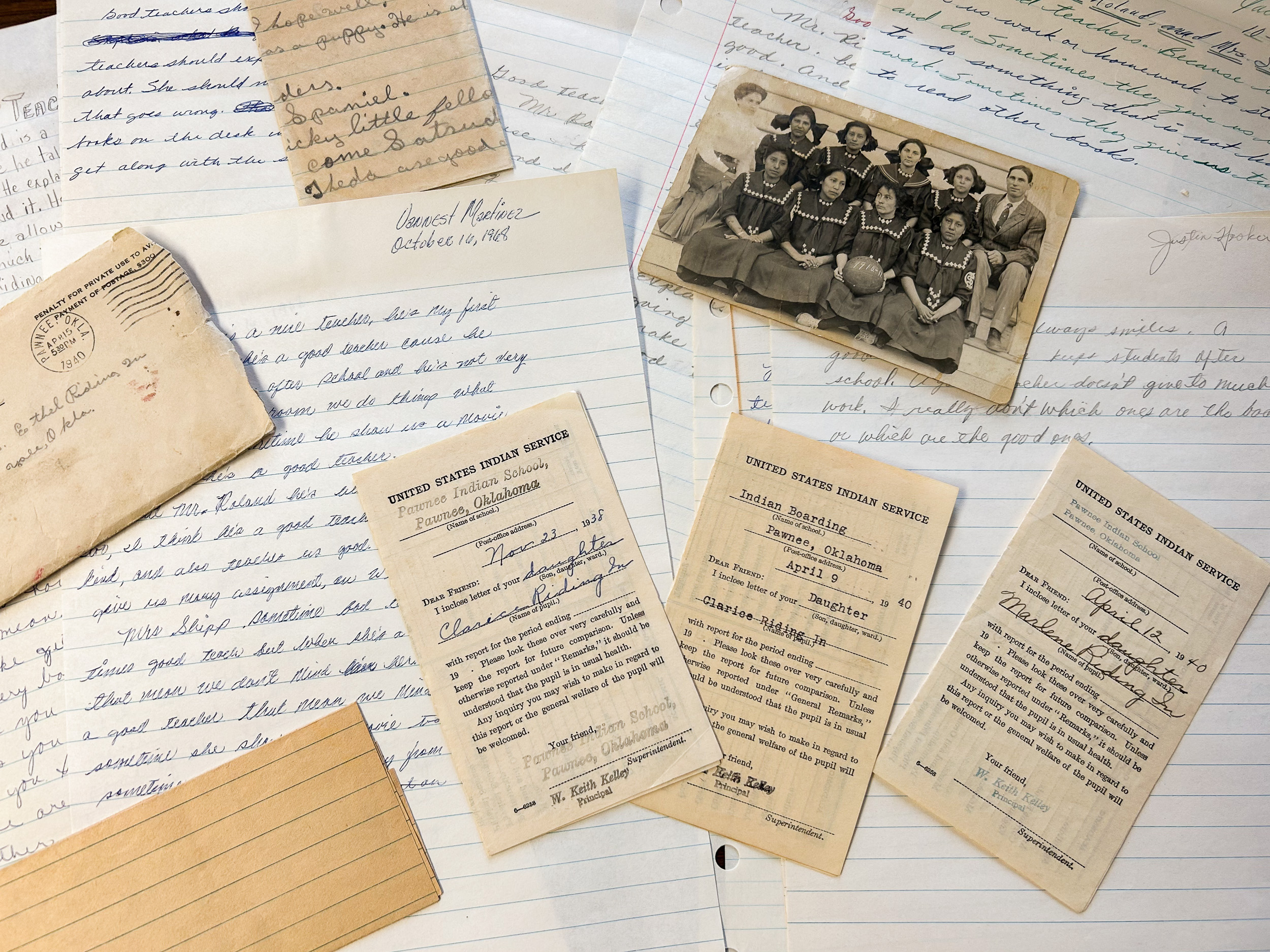
Letters written by her father’s school students in 1968, as well as letters written to home by her late aunt Clarice in 1940, only a few months before she passed. “My dad’s sister died upstairs when she was 10 years old of spinal meningitis,” said Riding in Hare. “Her younger sister, who was 8 years old, sat on the stairs right out there and cried when she found out.”
TYLIE GRIFFITH BOOKOUT / NEXTGENRADIO
“My grandmother was a real small, little lady,” Riding In Hare said affectionately. “But I always felt so safe with her. I always felt that, because of the respect that people had for her, that I was always safe, right by her side. Even during political times, you know, when there was a lot of conflict politically, I knew that if I was next to her, that I was safe.”
Riding In Hare takes pride in her Pawnee heritage, finding her home in the Pawnee lands in Oklahoma because of the stories and memories of her family that are deeply woven in.
“I’ve lived a lot of places,” she said. “But I’ve never felt the contentment that I have living here. And it’s kind of like a magnet, you know, and it draws people back.”
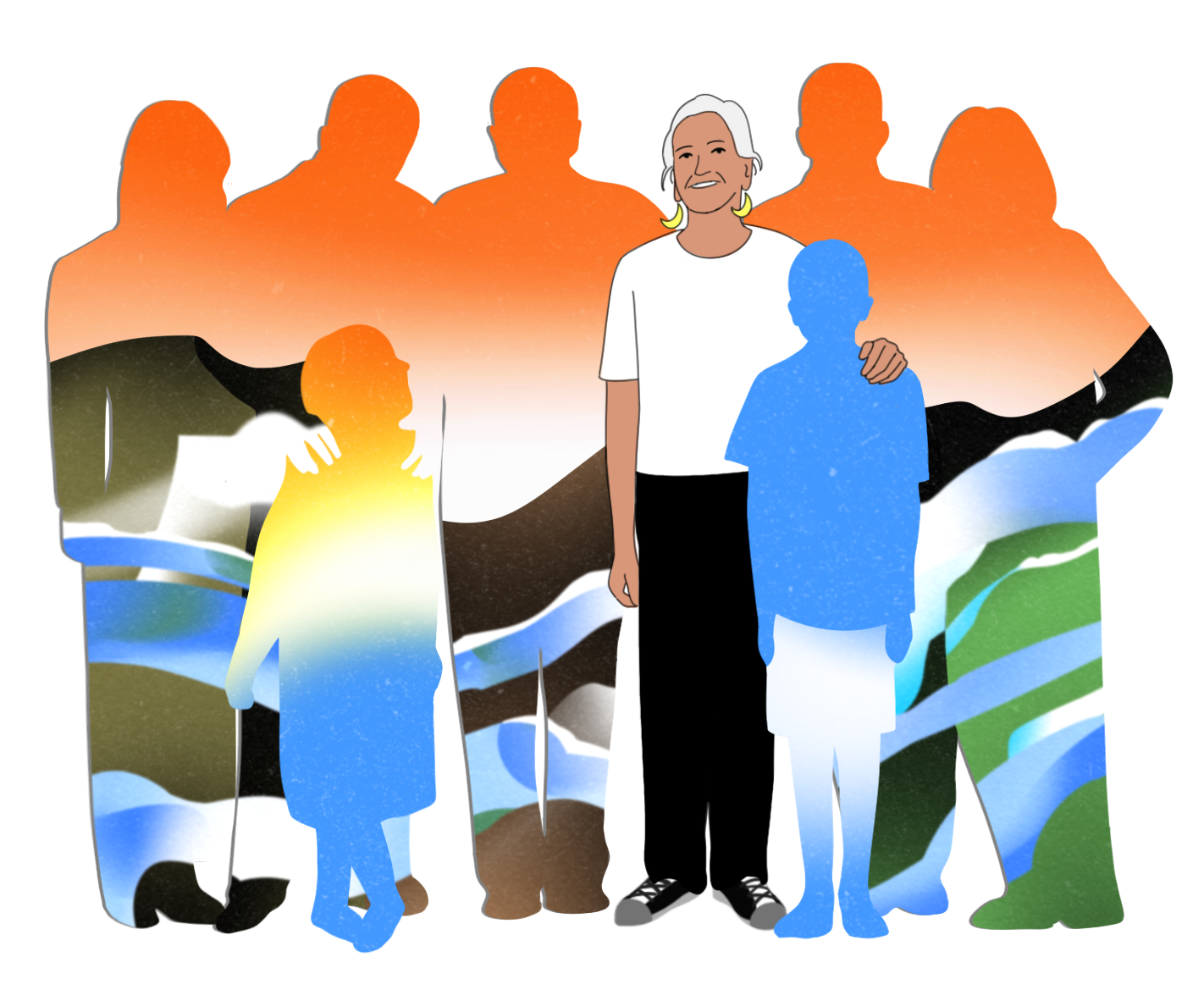
ARD SU / NEXTGENRADIO
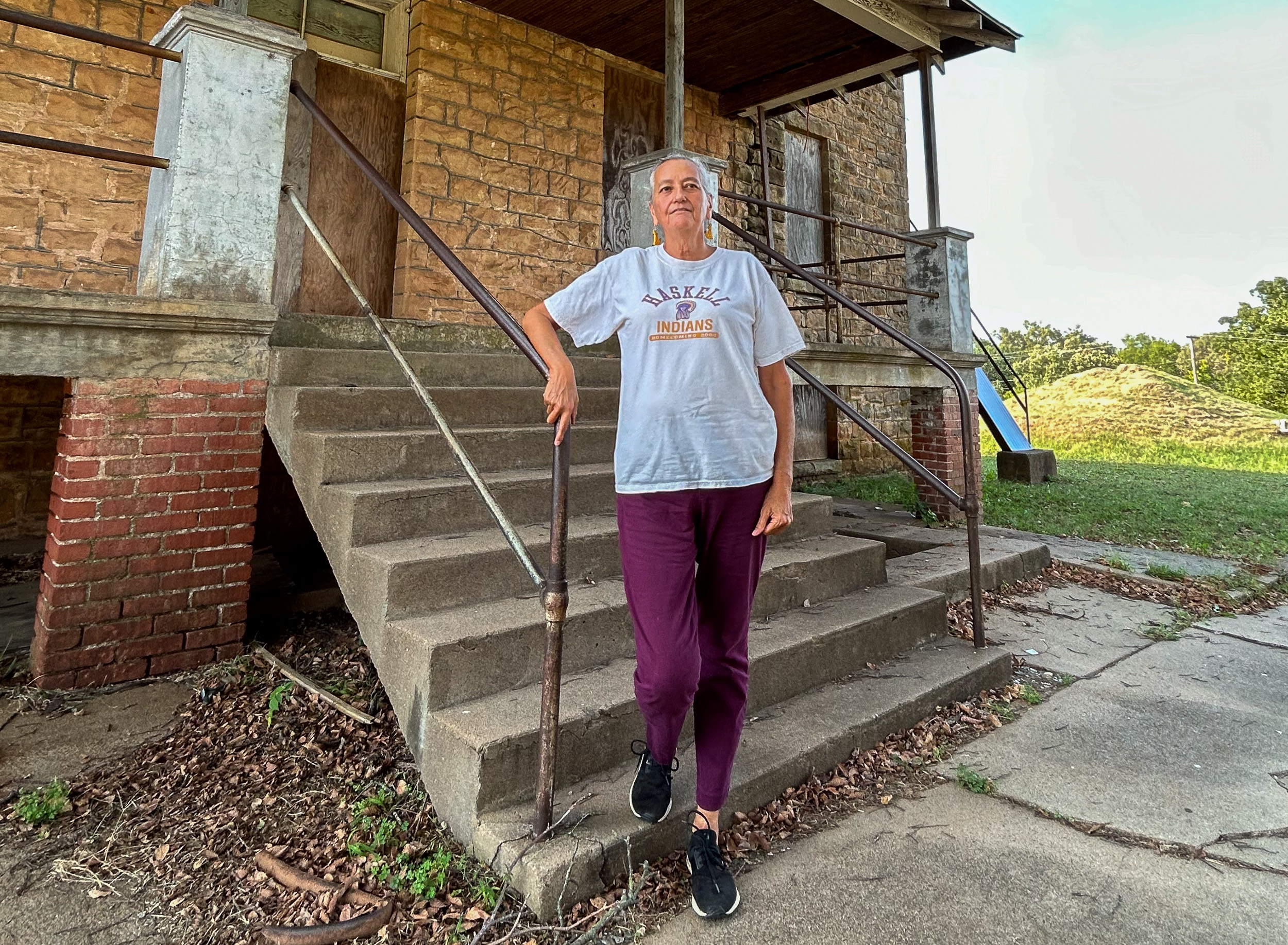
Monday, Oct. 2, 2023, Riding in Hare stands in front of the Pawnee Indian School’s boys dormitory where her father lived, now a rundown building awaiting construction. “I do it for my grandparents. I do it for my father, though they’re not with us anymore,” she said. “I would always want them to be proud of me.”
TYLIE GRIFFITH BOOKOUT / NEXTGENRADIO
